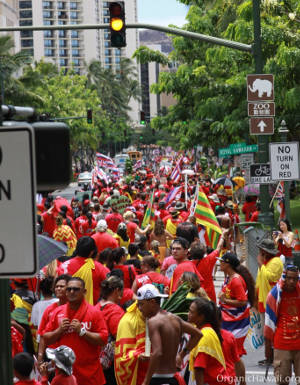This newsletter is republished from GMO Free Hawai’i (GMOFHI):
Our Right to Health
GMOFHI is pleased to announce “Our Right to Health”, a speaking tour of two scientists to our islands, Dr. Stephanie Seneff and Dr. Judy Carman. They will discuss the results of health and safety studies concerning Glyphosate and GMO foods, respectively. This is a great opportunity to become more fully informed about the safety issues and to hear in detail some of the problems associated with these products, so commonplace in our lives and communities.
Dr. Stephanie Seneff, for 30 years, has been a researcher and scientist in the Computer Science and Artificial Intelligence laboratory at the Massachusetts Institute of Technology links the research with the alarming rise in today’s diseases. Dr Senneff will be connecting the dots between the rise in the use of glyphosate, the active ingredient in the commonly used herbicide “Roundup,” and the link to the increase in obesity, allergies, autism, alzheimer’s (and more).
Dr. Judy Carman holds a PhD in Medicine, nutritional biochemistry and metabolic regulation; Dr. Carman conducted research on some of the first long-term, independent, animal feeding studies to investigate the safety of GMO crops in regards to human health. She will be talking about the safety of GM crops, including the research she has conducted with some of the first animal studies.
Please join us at one of these upcoming dates, for Pupus and an opportunity to meet our speakers:
EAST HAWAI’I ISLAND – Contact: Chandell 808-896-1686
Sat. July 25th – Waimea, 1:30 to 5 PM
Tutu’s House, 64-1032 Mamalahoa Highway, Kamuela
Sun. July 26th – Honoka’a, 6 to 9 PM
North Hawai’i Educational Research Center (NHERC)
45-539 Plumeria Street, Honoka’a
WEST HAWAI’I ISLAND – Contact: Sharon (808) 938-4807
Mon. July 27th – Kona, 6 to 9 PM
County of Hawai’i Civic Center
74-5044 Ane Keohokalole Highway,
Bldg B (above the harbor)
Road-side Herbicide Spraying
During a recent legislative annual budget hearing, the County of Hawaii Council heard a full day of community testimony on the subject of de-funding the county’s road-side herbicide program, and replacing it with safer alternatives. Many ideas were presented, and the director of public works, as well as many council members showed support for trying a different approach. If you have any ideas that you would like to share with the county, please contact Public Works Director Warren Lee’s office at (808) 961-8321 and politely present concerns and ideas for solutions (we realize having our children walk through road sides sprayed with Roundup is an emotional issue). There are many different climates on Hawai’i Island to content with, so providing road-side weed control solutions is bound to require varied approaches.
Here is a short list of solutions. Please email GMO Free Hawai’i with other ideas to continue to add to this list.
- Vinegar
- Steam
- Physical removal- such as around specific areas like waterways, as well as part of a long term replacement program with other types of plants besides “weeds”. Large stretches of the Hilo/Volcano hwy, for example, were once maintained in such a way, along with a mowing program in the shorter term. Once weeds have been removed the roadside can be planted with native plants, especially those that attract pollinators.
- Animal, via portable pens
- Flaming
- C-Cide Concentrate (Testing in Kapoho by Hawaii’s Coalition for Alternatives to Pesticides)
If you haven’t signed and shared the petition to stop the county’s road-side herbicide spraying, please do!

